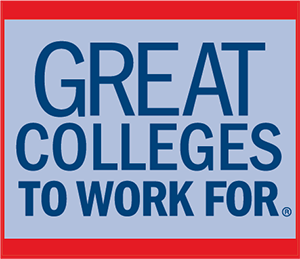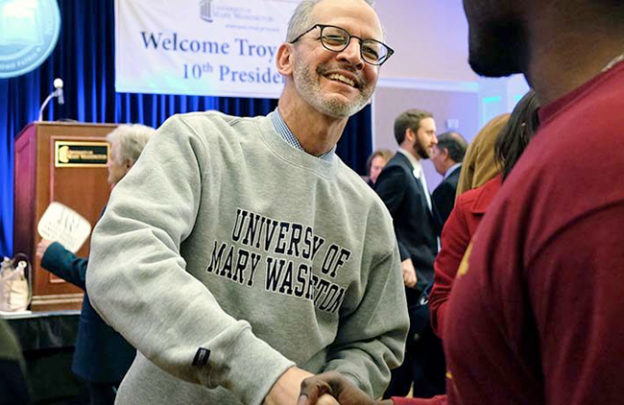An excerpt from an article entitled “Courage at the Top” included as part of the 2019 ModernThink Higher Education Trend Report, a free report given to all Great Colleges participants.
INTRODUCTION
Through our survey, we’ve been able to identify a number of differentiating qualities of truly great workplaces. One overarching theme is the critical role senior leaders play in the stewardship of an institution’s culture. This is particularly true for presidents just starting their tenure at an institution. Increasingly, we see presidential transition as an impetus for participation in Great Colleges, whether that is prior to a president arriving so they have data to work with, or after new presidents arrive so they can leverage our survey and program to provide a baseline assessment of culture and a communication tool for dialogue and transparency.
Within the Great Colleges program, successful cultures at recognized institutions are not achieved by accident. They are the direct result of senior leadership’s commitment to the welfare of employees and the quality of their workplace experience. Both new and tenured leaders understand that stewardship of the culture is every bit as important as stewardship of financial resources. A key aspect of workplace engagement is not just the creation of an inclusive culture, but the courage to embrace change and challenge the status quo. For this post, we are highlighting the University of Mary Washington and our interview with their President, Dr. Troy Paino.
University of Mary Washington
In our interview with Dr. Troy Paino, President of the University of Mary Washington (UMW), we focused on how the survey results and employee feedback from 2016 were used as part of the leadership transition, both as a communication tool as well as a platform for change and priority setting. Those changes lead to great results in 2019 – the University not only received improved scores, but also recognition status in the Great Colleges program.
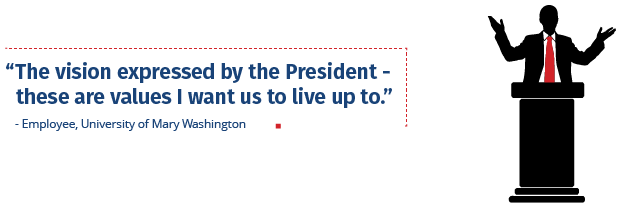
Q & A
Q: Please share background on your experience with the Great Colleges to Work for survey. This could include your knowledge of it through COPLAC and/or having used it at another institution.
A: I became aware of the survey during my presidency at Truman State University. Both Truman and the University of Mary Washington are active members of the Council of Public Liberal Arts Colleges (COPLAC).
Q: What were your goals for 2019 Great Colleges participation?
A: UMW last conducted the survey in the spring of 2016, just a few months before I arrived. Its results indicated that with focused attention we could make a good workplace even better, and we have been intentional in our efforts to address the issues identified. As I finished my 3rd year as President, it was an excellent time to again listen to those faculty, staff, and administrators who commit themselves to our students’ success. The survey provided us with an opportunity to identify both where we’ve made progress but also where there is still work to do.
Q: How did the 2016 survey feedback shape your first year priorities (i.e. vision)?
A: The survey gave me an important diagnostic tool to better understand how the people who work here felt about the state of the university. To move UMW forward, we needed the faculty, staff, and administrators to be fully invested in the school’s strategic direction. To get this sort of investment, our senior leadership had to build trust and instill hope. The 2016 survey showed me that our priorities were to improve communication—and that includes listening; more clearly articulate a vision that resonates with the values, mission, and culture of UMW; and address salaries that had fallen behind the market.
Q: Share more about your process in using the data from 2016, i.e. tasking the Leadership Council with recommendations involving your high potentials in the ideation process, and then ultimately making the decision on what areas to move forward with? What worked – what didn’t?
A: The results of the 2016 survey gave us a jumping off point to engage the UMW community around the challenges facing the University. Openly talking about the survey’s results demonstrated our desire to have deeper conversations around how people were feeling about the workplace, whether they felt valued or not, and what their hopes and dreams were for UMW. These conversations laid the foundation for what would ultimately become our University’s vision for the future. I really got a sense of the heart and soul of this place as people not only opened up about their disappointments and frustrations, but also about what gave their work meaning and why they invested so much of themselves in what they do for our students. It allowed the vision we created to be very organic, and frankly, made it easy to sell. I actually kept a summary of the 2016 survey results on my desk as a reference on and reminder of what leadership needed to do to build more trust. Did we always get it right? No. As I start my fourth year here, I am still looking for the most effective way to communicate and have those critically important conversations with the UMW community about the difficult issues facing the University. While we have made progress on a number of dimensions, and our employees indicate we are moving in a positive direction, we still have a long way to go.
Q: In what ways did the survey results and process that followed shape your leadership team?
A: We regularly used the 2016 results to remind ourselves of opportunities for growth. It is important to remember that while some of what the faculty, staff, and administrators were telling us was difficult to hear, the leadership teams both before and after my arrival had the courage to listen. It would have been easy to become defensive or dismissive, but my leadership team chose the more difficult and courageous path. They listened, reflected, and then committed themselves to action. It is also important to 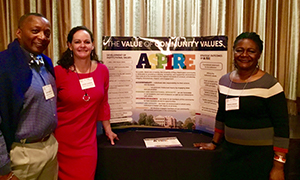 remember that the results of that survey gave us a glimpse of what is amazing about this University. Despite the challenges, the people who work here love this place, love each other, and love our students. Those relationships and their dedication are what really make Mary Washington a special place.
remember that the results of that survey gave us a glimpse of what is amazing about this University. Despite the challenges, the people who work here love this place, love each other, and love our students. Those relationships and their dedication are what really make Mary Washington a special place.
Q: Can you share more about the “values work” / ASPIRE and how that informs your and other stakeholder’s decision making and behavior?
A: In the wake of the 2016 survey results and the subsequent articulation of a vision, we felt it was important for our community to come together to affirm our values and commitment to the work we do with students. While conversations about values can be perilous in some institutions, at UMW it was an inclusive and uplifting experience. The outcome of this intensive work is known as ASPIRE, which articulates what this community values. Now, when difficult issues arise on campus, as they inevitably do, our students, faculty, staff, and administrators use those values as a reminder of who we strive to be and how we “aspire” to work together. Because everyone had a chance to participate in the process of articulating these values, they carry weight and credibility when I or anyone else references them in our work together.
Q: What will you do the same/differently with your results this year?
A: As we did before, we will listen, learn and commit ourselves to action. While identifying the progress is gratifying, quite honestly I’m more interested in the work we still must do to make this an even greater college to work for. Those results present many opportunities for growth, and we will pursue them.
Q: What advice do you have for new presidents in terms of participation in the survey?
A: In order to improve their workplace and campus cultures, administrators and presidents must check their egos at the door. Employees will be forthright if they believe their input is genuinely desired. That honesty can point out blind spots and delve into shortcomings faster and more effectively than may be comfortable.
Q: How do you plan to celebrate your recognition this year?
A: One of the most helpful aspects of the survey is that we learned we should take more opportunities to celebrate what a unique and extraordinary institution we have. The external proof abounds— our graduates quickly secure roles with salaries well above the market averages, they carry little debt, and newest alumni lead giving to UMW. What’s challenging is that we’ve forgotten how exceptional our story is on the higher education landscape, and we need to do more to reinforce this message internally. Once the news can be shared, we intend to make the most of it! From the initial celebratory internal and external messaging and events to ongoing recruiting/training communications, across the University we will highlight our progress and shine the spotlight on our faculty and staff. They deserve the recognition.
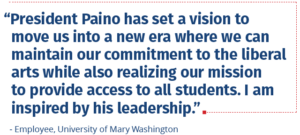
ABOUT PRESIDENT PAINO
Dr. Troy D. Paino took office as the tenth president of the University of Mary Washington, effective July 1, 2016. A personable, student-focused leader, Paino is deeply committed to Mary Washington’s public liberal arts and sciences mission of providing academic excellence and social uplift in equal measure. Prior to coming to UMW, Paino served for six years as president of Truman State University in Kirksville, Missouri.
Dr. Paino is a member of the Association of American Colleges and Universities (AAC&U) President’s Trust for Liberal Education and America’s Promise (LEAP). He is an executive committee member and past president of the Council of Public Liberal Arts Colleges (COPLAC). He is a member of the NCAA Division III Chancellors/Presidents Advisory Group, the NCAA Division III President’s Council, and the Campus Compact for VA Advisory Board. He also serves on the Growth4VA President’s Working Group. Paino earned doctorate and master’s degrees in American Studies from Michigan State University and a juris doctorate from Indiana University. His teaching and scholarly interests include American higher education, 20th-century cultural and social history and American legal history.
